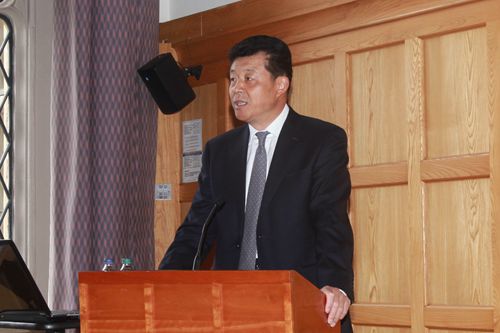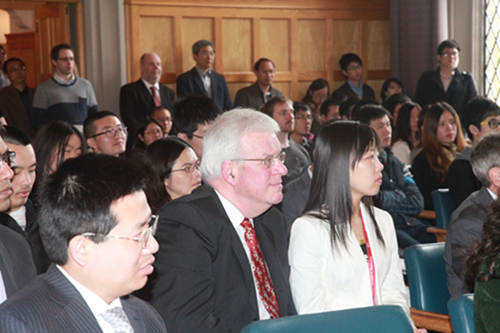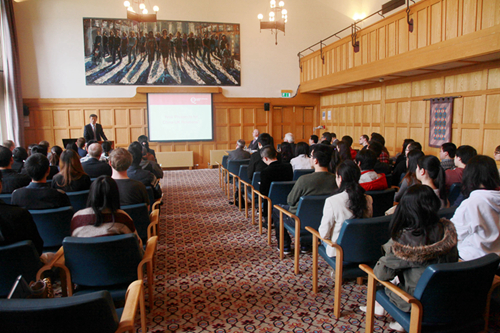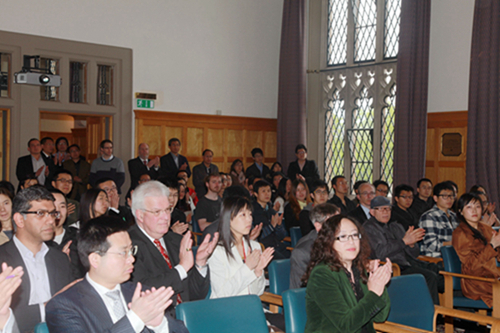|

(Queen's University, Belfast, 20 May 2013)
Faculty members and students,
It is a real pleasure for me to make my second visit to Queen's University here in Belfast.
My first visit was last year when I accompanied the then Chinese State Councilor and now Vice Premier Madame Liu Yandong.
I am told more than 400 Chinese students are studying in your university. I am certain they are attracted to Queen's not only for the natural beauty in Northern Ireland but also because of your long proud history and academic excellence. The proof of your high levels of scholarship is your membership of the prestigious Russell Group.
Late last year I was invited to speak at the Oxford University. In my speech at Oxford I reviewed China-Britain relations over the past nearly two centuries. There have been many milestones:
· The Macartney Mission.
· The Opium War.
· The alliance during World War Two.
· The establishment of ambassadorial diplomatic relations in 1970s.
· The return of Hong Kong in 1997.
· The launch of the China-UK comprehensive strategic partnership this century.
All these milestones illustrate one theme, 'History Tells'.
Today, instead of analyzing the past, I want to look ahead to the future.
But to fulfill the task, I need to first introduce to you a new concept. This is called 'a new type of relations between big countries'.
This concept was originally brought forward in the report delivered at the 18th Congress of the Communist Party of China.
The report states that China should establish a new type of relations with developed countries. The aim is to secure long-term stability and healthy development. This concept defines China's aspired relations with the entire developed world. Obviously it applies to China-UK relations.
Then what are the essential elements of the new type of China-UK relations?
I will give you my answer based on over three years of ambassadorship in the UK. I want to start with your university coat of arms. The design features a crown and four symbols:
· A book for the university.
· A sea horse for Belfast.
· A red hand for Ulster.
· And a harp for Ireland.
Likewise, I believe there are four fundamentals for the new type of China-UK relations we aim for. These add up to my dream for China – UK relations:
First, understanding.
Understanding has two stages. The first stage is knowledge.
Confucius said:
'To remain unsoured even one's merits are not recognized by others. Isn't that what's expected of a gentleman?'
He also said:
'I do not worry that others do not know me. I am bothered that when I do not know others.'
This is of course an expression of humility and generosity. The spirit of the sayings is certainly relevant to China-UK relations.
In my view understanding should be two-way. Both sides should make sincere efforts to understand each other. At the same time, both sides should make themselves understood.
The second meaning of understanding is respect.
Respect is an attitude based on knowledge. I may not necessarily support your views. But I respect your views. We need such generosity and magnanimity. We should agree to disagree.
I have no doubt that people of Northern Ireland feel strongly about the importance of mutual respect. Mutual respect of different ethnic groups, religious sects and political parties is critical to the reconciliation in today's Northern Ireland.

Then why is mutual understanding and respect so important for China-UK relations?
This is because our two countries are so different in history, culture, development stage and social system.
We must approach these differences with a reasonable mindset.
For example, if we always consider ourselves in the right and others in the wrong - then these differences will set us apart. But, if we can manage these differences with openness and inclusiveness, if we can understand and respect each other, then these differences will bring us closer.
To this end, China and Britain should share these values:
· Fully understand each other's history and culture.
· View each other's national realities and political system in an objective light.
· And respect each other's independent choice of development path.
Building on mutual understating, we can take further steps to draw on each other's strengths:
· Our two countries should increase exchanges on governance at all levels.
· Our two countries should create more successes drawn from mutual learning, such as sustainable cities, GP system, creative industry, and civil service administration.
The second fundamental is mutual trust.
Based on mutual understanding, China and Britain should build mutual trust. Our mutual trust should be reflected in 'befriendment'. This means we should see each other as partners and friends, rather than opponents and enemies.
Between China and Britain, there are neither geopolitical conflicts nor outstanding historical issues. This is a favorable condition for China and Britain to build mutual trust. This condition did not come automatically. It is attributable to the hard work of our forefathers.
As a Chinese saying goes:
'One generation plants the trees in whose shade another generation rests.'
In this sense should be grateful to the wisdom and courage of the late Mr. Deng Xiaoping and Lady Thatcher. Between them they resolved the question of Hong Kong.
China and Britain are both countries of significant influence. It serves the fundamental interests of both sides that we partner with one another, view each other's development as opportunities and work together for common development.
China-Britain mutual trust should also be embodied in 'doubtlessness'.
This means the behavior of both sides should be predictable and reliable.
To be more specific. Each country should be sure that the other side will not harm its core interests and will accommodate its major concerns. If we can do this, then our relations will be able to avoid past mistakes.
As we all know, in the past year China-Britain relations suffered from British leadership's meeting with the Dalai Lama. The issue of Tibet concerns China's sovereignty and territorial integrity. It represents China's core interests. I have noticed that Prime Minister David Cameron has recently reaffirmed British policy towards Tibet in the House of Commons. He said "We recognise Tibet as part of China. We do not support Tibetan independence, and we respect China's sovereignty". Prime Minister Cameron also stated that Britain wants to have a strong and positive relationship with China. We hope Britain will honor its commitment and match its words with deeds.
The third fundamental is dialogue.
Dialogue is both a means for our relations to succeed, and a spirit that our relations must always follow.
I want to quote an ancient Chinese philosopher Mencius to underline the importance of dialogue:
'A trail through the mountains, if used, becomes a path; but if unused, becomes blocked by grass in short time.'
The same truth applies to dialogue.
When we keep open dialogue, our relations will progress smoothly. Without dialogue, our relations will be blocked and stalled.
When we cooperate, we need dialogue to broaden and deepen cooperation. The economic and financial dialogue is a case in point.
When we strengthen links, we need dialogue to increase people-to-people exchanges and enhance understanding and friendship. This is where high-level people-to-people exchange fits in.
In face of changing international situation, we need dialogue to build up strategic mutual trust and safeguard our common interests. A good example in this field is strategic dialogue.
In case of difficulties, we need dialogue to strengthen communication and properly manage differences. This is where human rights dialogue has a role to play.
The fourth fundamental is cooperation.
Cooperation is the most tangible and strongest bond in state-to-state relations.
To establish the new type of relationship, cooperation between China and Britain should be all-dimensional:
· Bilaterally, it should cover trade, finance, education, culture, science and technology.
· Multilaterally, it should range from counter terrorism, non-proliferation, cyber security, climate change to global economic governance and opposing trade protectionism.

Our cooperation should be not only broad, but also deep.
Take the financial sector as an example.
Our two countries already have good cooperation in financial regulation and personnel training. The operation and investment of our financial institutions in each others' countries are expanding.
Yet we should not be complacent. Instead, we should deepen such cooperation and seek greater opportunities. For example, turning London into an offshore centre of RMB business. This is a project that will make a huge difference in our financial and economic cooperation.
The goal and result of cooperation should be mutual benefit. Let me give you some examples:
· China Investment Corporation acquired shares of Thames Water and Heathrow airport.
· China's Brightfood bought Weetabix.
· China's Huawei is planning to invest 1.3 billion pounds in Britain.
All these exemplify the win-win results of our cooperation.
Chinese companies have abundant funds and are encouraged by open British markets. They either bought strategic assets to boost their own brands and technology or scaled up their R&D budget in Britain. Some have invested in British public facilities for long and stable returns. Such cooperation has promoted the growth of Chinese companies and helped them go global. It has also boosted local growth and employment in Britain. I am sure there will be more such success stories in the future.
Our cooperation does not stop at economic field. It has extended to education, science and technology. I am glad to learn that Queen's has established a partnership with China Medical University. Moreover, Queen's is running the Science Bridge Project in collaboration with some Chinese institutions of higher learning. I am sure these will create more opportunities and open up broader space for cooperation between Queen's and Chinese universities and scientific research institutions.
The above four elements of understanding, mutual trust, dialogue and cooperation are related to each other. At the same time, they each have its own focus. I would say understanding is the foundation, mutual trust is the key, dialogue is the means, and cooperation is the goal.
Only with mutual understating, can we enhance mutual trust. Only with mutual trust, can we intensify dialogue. Only through dialogue can we have fruitful cooperation.
Over the past three years, British friends have often asked me what delights me most and what upsets me most? My answer is understanding from others makes me happy, while 'misunderstood by others' makes me worry.
Every time I read false reports on China by British media, every time a British friend back from China trip tells me that the China they see is completely different from the China they read in British media, I feel keenly how central understanding is to relations between countries and friendship between peoples. This also makes me deeply aware of my responsibility as an ambassador.
In China we often say, 'Long live understanding'. This speaks volume about how much we value understating. Indeed, to know is not easy; to understand is even more difficult. But understanding is not an unreachable high.
Before this visit, I did some reading about your university. One story struck me. Your Mountaineering Club produced three Everest summiteers. This is an exceptional accomplishment. Inspired by your extraordinary feat, I believe as long as we have firm conviction and make relentless efforts, we will conquer the summit of understanding.
In turn, with mutual understanding, we will be able to enhance mutual trust, deepen dialogue and expand cooperation. Then the new type of China-Britain relationship will come true. I am sure this new type of relationship will bring greater benefits to our two countries and to the world.
Thank you!

|

